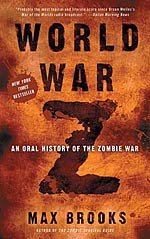
![]() SueCCCP
SueCCCP
1/1/2013
![]()
One of the really enjoyable aspects of this book is that it uses such an unusual narrative form. This allows it to show us a much greater range of points of view, and to explore the reactions to the plague seen in many different cultures. It makes a great deal of sense to me that the highly cooperative Japanese and Chinese would react very differently than the highly individualistic Americans, for example. I can understand why some regimes would be more likely to repress information and try to hide the truth from their citizens and other nations. I also liked the way that Mr Brooks showed us a number of 'solutions' to the same problem, each growing from the individual societies and their situations and each uniquely suitable to the resources at hand. He also takes us through the typical responses that we would expect, such as massing the US army at Yonkers, and shows us how they fare against this new type of enemy.
Some of the interviews have funny sections, others horrific, whilst the some will just make you see red with anger because of the attitudes on display. I do not intend to go through all the people that are interviewed, but I will mention a selection.
Personally, I found the total cynicism of the marketer of Phalanx to be the most morally repellent to read. This man seized the opportunity to promote a rabies vaccine as a preventative treatment for the 'African rabies', as the zombie plague was first called. He knew perfectly well that Phalanx would offer no protection from the actual infection, but tricked people into purchasing billions of doses. Not only was he lie fraudulent and a totally immoral way to make a vast fortune, but it also led to many more people being infected because they thought that they had protection. This reminds me very much of the HIV / AIDS deniers, especially in South Africa, who were responsible for promoting useless treatments whilst dismissing proven antiretroviral drugs as actually inducing the disease, thus causing millions of more infections and deaths.
One of the funniest sections is that of a mercenary who was hired to protect the home of an incredibly wealthy celebrity. The celebrity decides that it would be a good idea to invite all the famous and beautiful people to live in his fortress home while they are constantly filmed and broadcast live to the rest of humanity: like a permanently running 'Big Brother'. While the outcome of this social experiment is fairly predictable, it does finish with an exchange between the mercenary and a Chihuahua that is laugh-out-loud funny.
The section I found most difficult to read, and which had me crying like a small child was one that dealt with American dog handlers. For some reason I always find it harder to see animals put in peril rather than humans. I am not sure what this says about me, but that is just how I am: I am always more worried about the pets than their owners! I find working dogs absolutely extraordinary in normal life, whether they are sniffer dogs, search and rescue or helping the disabled, so to read about their invaluable use in a war against the undead was very moving. If you are a dog person, like me, then I recommend a box of tissues for this chapter, or simply skip over it if you think it will upset you too much.
One of the most uplifting and spiritually fulfilling sections dealt with a Japanese man who had been blinded by one of the nuclear explosions at the end of World War II. After that he was a useless outcast in Japanese society, and had finally become a gardener for an up-market hotel. When the zombies began to rise he walked out into the forests intending to meet this death and remove a burden on society. Instead he discovered a purpose for living, something that he had never had before, and the rest of his story is amazingly inspiring. I particularly appreciated how Mr Brooks completely understood the mentality of this broken person, which is so alien to that of an able-bodied westerner.
Finally, I want to mention the section based upon the international space station. Surprisingly, this does not have the terrible claustrophobia that you might expect, because it is told from the perspective of a very experienced astronaut who had been fully prepared for his time in space. However, the resilience of the people who chose to stay in space, with no hope of support or rescue, in order to keep the satellite system working, was amazing. The interviewee never expresses any despair or regret for what they did and must have been a truly remarkable individual to withstand the psychological pressure of such isolation.
As you can see, this is not necessarily an easy read and there are some truly horrible descriptions of the effects of the 'infection'. The psychological effects of the plague are also heart breaking, but the way in which individuals rise to the challenges that they face is very inspiring. This is a thoughtful and thought provoking read, that says a great deal about various modern societies and their strengths and weaknesses.
For my complete review, click the link below:
http://coffeecookiesandchilipeppers.blogspot.com/2012/11/world-war-z-by-max-brooks.html